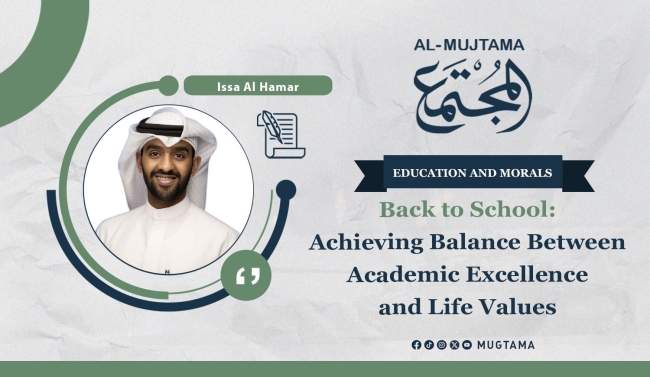Back to School: Achieving Balance Between Academic Excellence and Life Values Featured
As the new school year begins, the question always arises of how to measure our children's success in school, and whether school alone is a true standard of excellence and achievement. I remember when I was in elementary school, I was one of the outstanding students, as is the case with most children at this stage. However, with the transition to middle school, academic differences begin to emerge. When a student experiences a decline in performance, they may begin to doubt their abilities and self-confidence. But is school alone the true measure of intelligence or success by which we can be proud of our children?
Importance of Education and Its Role in Determining Interests
Education is undoubtedly important. It provides children with the necessary foundations for learning and opens up various fields that help them discover their future interests. For example, a child who dislikes biology is unlikely to choose medicine, while one who enjoys studying physics might find engineering to be a suitable field. However, it is wrong to consider school as the only standard by which we measure our children's success, especially in our Arab societies, where education often relies more on memorization than understanding and analysis. Education that focuses solely on memorization lacks practical life applications, which hinders the development of intellectual abilities.
Multiple Types of Intelligence
There are many types of intelligence that traditional exams do not measure. For example, linguistic intelligence appears in a person's ability to arrange words and in creative writing, while bodily-kinesthetic intelligence is seen in fine physical skills, as demonstrated by famous football player Lionel Messi. The genius of someone like Messi cannot be assessed through traditional school tests, highlighting the need for a comprehensive and multifaceted way to measure children's intelligence and abilities.
Moral Values Versus Academic Achievement
In our societies, the standards of success differ from those in Western countries, where values, morals, and religion are considered more important than academic certificates. If we were to choose between our children having high morals and strong faith or becoming scholars with prestigious positions but lacking in ethics, there is no doubt that the first option would be more appropriate. Unfortunately, we see some parents overly focused on academic achievement, punishing their children for not achieving high grades while overlooking behavioral or moral issues. This reinforces in the children's minds the idea that worldly success is more important than spiritual values.
Balancing Knowledge and Values
Allah says: “And thus we have made you a just community” (Al-Baqarah: 143), and this “Just” should be present in all aspects of our lives, including the education of our children. We must teach them that knowledge is important, but it is not the only goal in life. True success lies in achieving a balance between knowledge and faith, between academic diligence and moral striving, for every individual is facilitated toward what they were created for. Effort is required, but the results are always in the hands of Allah.
We must be keen on raising our children on balanced foundations that include both knowledge and morals, and teach them that success is not measured solely by certificates, but by the impact they leave on their community and spiritual life.
-------------------------------------------------------------


